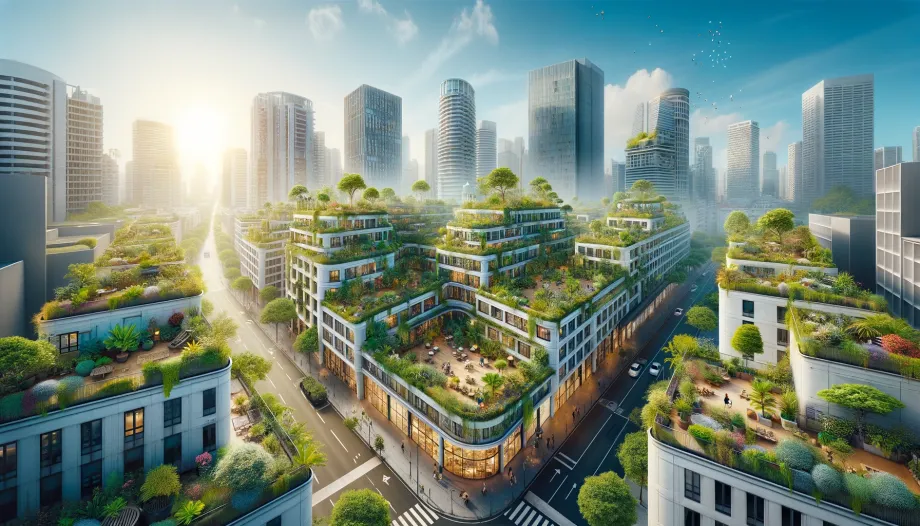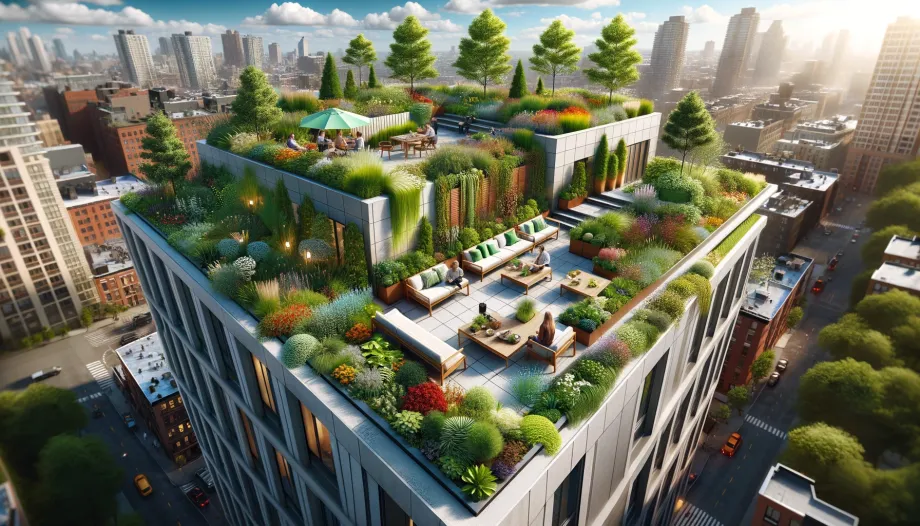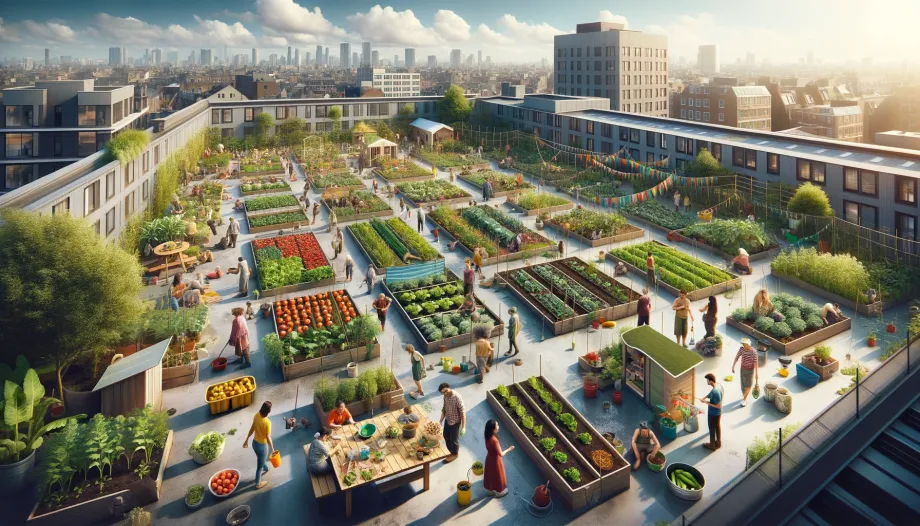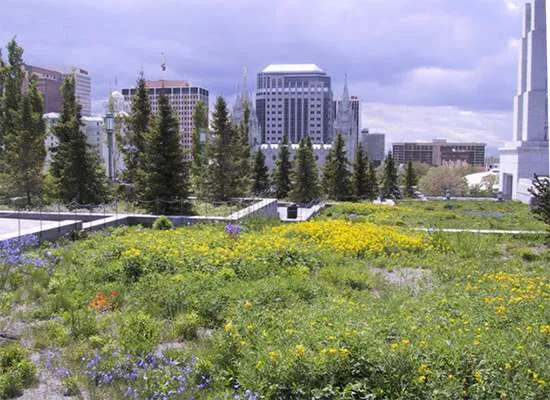This post may contain affiliate links. If you buy something from one of our links we may earn a commission. Thanks

Explore the benefits of rooftop gardening! From enhancing urban air quality to creating serene green spaces, discover how rooftop gardens transform city living.
Rooftop Gardening Benefits Key Takeaways:
- The benefits of rooftop gardening are:
- Energy efficiency
- Improve air quality
- Reduced heat island effect
- Stormwater management
- Extends roof life
- Increases property values
- Wildlife habitat
- Effective use of rainwater
- Insulates buildings
Ever wondered about the benefits of rooftop gardening? Imagine transforming unused city spaces into vibrant green havens.
It’s not just about adding a splash of green; rooftop gardens bring a host of advantages, making urban life healthier and more enjoyable. Let’s dive into this green revolution in our cities!
Embracing the Skyline – The Benefits of Rooftop Gardening
In the heart of bustling cities, where concrete jungles dominate, rooftop gardens emerge as a breath of fresh air, transforming barren rooftops into vibrant oases.
These elevated havens not only embellish urban landscapes but bring a multitude of benefits to our environment and society.
From improving air quality to enhancing property values, rooftop gardens represent a harmonious blend of nature and urban living.
As we explore the world of rooftop gardening, we’ll delve into its various advantages, understand its role in urban ecosystems, and address common queries about its sustainability and effectiveness.
This journey through the verdant paths of rooftop gardens promises to enlighten us about this innovative approach to greener, healthier cities.
Environmental Benefits of Rooftop Gardening
Rooftop gardens are more than just a visual treat; they’re a vital cog in the wheel of urban environmental sustainability.
By turning underused roof spaces into green areas, they address several environmental concerns unique to urban settings. Here’s how the environmental benefits of rooftop gardens make a significant difference:
1. Reduction in Greenhouse Gas Emissions and Improved Air Quality
Imagine a city where each building’s rooftop serves as a natural air purifier. That’s what rooftop gardens offer.
By incorporating plants and greenery, these gardens play a crucial role in absorbing harmful pollutants and carbon dioxide, substantially reducing the urban carbon footprint.
The lush greenery of rooftop gardens not only enhances air quality but also contributes to the decrease in smog production, making our cities healthier places to live.
2. Decreased Waste and Increased Efficiency
Rooftop gardens are a testament to efficient urban planning. They extend the life of roofing materials by protecting them from the elements, which means less waste and more sustainability.
Additionally, the natural insulation they provide reduces reliance on artificial heating and cooling systems, leading to significant energy savings and a decrease in the overall environmental impact of buildings.
3. Effective Use of Rainwater
In an era where water conservation is key, rooftop gardens are a boon. They utilize rainwater effectively, reducing the need for supplemental water sources.
This not only helps sustain the garden itself but also acts as a natural filter, reducing the amount of runoff and pollutants entering our drainage systems.
This lessens the risk of urban flooding, a growing concern in densely populated areas.
4. Control of Urban Heat Island Effect
One of the most striking benefits of rooftop gardens is their ability to combat the Urban Heat Island effect.
By replacing heat-absorbing concrete and tar with plants, these gardens help in lowering the temperature of urban areas.
The natural process of evaporation and transpiration from plants plays a crucial role in cooling the surrounding air, making our cities more comfortable during hot summer months.
A green roof, or rooftop garden, is a vegetative layer grown on a rooftop. Green roofs provide shade, remove heat from the air, and reduce temperatures of the roof surface and surrounding air. Using green roofs in cities or other built environments with limited vegetation can moderate the heat island effect, particularly during the day. EPA
5. Energy Efficiency
Rooftop gardens contribute significantly to energy conservation. By providing natural insulation, they keep buildings warmer in winter and cooler in summer.
This results in less energy consumed for heating and air conditioning, which not only lowers utility bills but also reduces the overall energy demand of the city, contributing to a more sustainable urban environment.
6. Urban Agriculture
Rooftop gardens open up new avenues for urban agriculture. In cities where space is at a premium, these gardens provide an opportunity to grow fresh produce.
This not only brings the joy of gardening to urban dwellers but also contributes to local food production, reducing the carbon footprint associated with transporting food items.
7. Wildlife Habitat
In the concrete-dominated urban landscape, rooftop gardens serve as crucial habitats for various species of birds, insects, and other wildlife.
They provide much-needed green spaces for these creatures, enhancing urban biodiversity and contributing to the ecological balance of our cities.
In essence, rooftop gardens are not just an aesthetic addition to urban landscapes; they are key contributors to environmental sustainability, playing a multifaceted role in making our cities greener, cleaner, and more livable.
8. Social and Personal Benefits of Rooftop Gardening
Rooftop gardens offer more than just environmental advantages; they bring a range of social and personal benefits that enhance our quality of life in urban settings.
From increasing property values to creating serene havens, these gardens significantly impact our social fabric and personal well-being.
9. Enhanced Property Values
A rooftop garden is not just a garden; it’s a valuable asset. It substantially increases the resale or rental value of properties.
In high-end neighborhoods, the presence of a well-maintained rooftop garden can lead to a potential increase in property value by 10-25%.
This enhancement in property value is a compelling reason for homeowners and real estate developers to invest in rooftop gardens, making them a financially wise choice in addition to their aesthetic appeal.
10. Extended Roof Life Expectancy
Rooftop gardens are a practical investment in the longevity of a building.
By protecting the roof covering from the harsh elements, these gardens can extend the life of a roof by up to an impressive 200%.
This means less frequent need for expensive roof repairs or replacements, translating to long-term savings for building owners.
11. Tax Incentives
Recognizing the array of benefits provided by green roofs, some cities have started offering property tax credit incentives for their installation.
These incentives not only make the initial investment in rooftop gardens more affordable but also underscore the societal value placed on sustainable and eco-friendly urban development practices.
12. Happiness and Aesthetic Appeal
In the hustle and bustle of city life, rooftop gardens serve as serene retreats. They provide much-needed contact with nature, a luxury in densely populated urban areas.
These gardens turn ordinary rooftops into beautiful, decorative spaces, offering residents and visitors a place for relaxation and enjoyment.
The aesthetic appeal of these green spaces contributes significantly to the overall well-being and happiness of urban dwellers.
13. Noise Reduction
One of the lesser-known but equally important benefits of rooftop gardens is their ability to reduce noise pollution.
The combination of soil and plants acts as a natural sound barrier, significantly dampening noise levels.
This is particularly beneficial in busy city centers and areas near airports, where noise can be a constant source of stress.
In conclusion, the social and personal benefits of rooftop gardens go hand-in-hand with their environmental advantages.
They not only enhance the aesthetic and financial value of properties but also contribute to the well-being and comfort of urban residents, making cities more livable and enjoyable.
Practical and Functional Benefits of Rooftop Gardening

Rooftop gardens are not only aesthetically pleasing and environmentally beneficial, but they also offer a host of practical and functional advantages.
These benefits make rooftop gardening an efficient and convenient choice for urban dwellers. Let’s explore these benefits, using bullet points for clarity on each subtopic:
Direct Sunlight for Plants
-
- Optimal Sun Exposure: Rooftop gardens bask in unobstructed sunlight, crucial for the healthy growth of many plants. This direct sun exposure is especially beneficial in urban environments where ground-level gardens might be shaded by buildings.
- Ideal for Sun-Loving Plants: They provide the perfect environment for sun-loving plants to thrive, contributing to a more diverse and productive garden.
Less Room for Weeds
-
- Reduced Weed Growth: The container-based nature of many rooftop gardens naturally limits the space available for weeds to grow, reducing the need for constant weeding.
- Easier Garden Maintenance: This translates to less labor-intensive garden maintenance, making rooftop gardening a more manageable and enjoyable activity for urban gardeners.
Flexibility in Arrangement
-
- Customizable Layouts: Rooftop gardens offer the unique advantage of being easily customizable. Plants in containers can be rearranged to suit aesthetic preferences or practical needs.
- Adaptability to Changing Conditions: This flexibility allows for adapting the garden layout to changing sunlight patterns, seasons, or even personal preferences, making rooftop gardening a dynamic and engaging experience.
In summary, the practical and functional benefits of rooftop gardening, such as optimal sunlight exposure, reduced weed problems, and flexibility in arrangement, make it an attractive and efficient option for urban residents.
These advantages simplify gardening, making it more accessible and enjoyable, even in the most densely populated urban environments.
The Multidimensional Impact of Rooftop Gardening

As we reach towards the culmination of our exploration into rooftop gardens, it’s clear that these verdant spaces are much more than just an aesthetic addition to urban landscapes.
They are, in fact, a critical solution to several urban challenges, offering a wide range of benefits that span environmental, social, personal, and practical dimensions. Here are the key takeaways from our discussion:
Key Takeaways:
- Rooftop Garden Benefits include improved air quality, reduction in urban heat, enhanced property values, and creating peaceful green spaces.
- They efficiently utilize urban space, offer fresh produce opportunities, and support biodiversity, significantly contributing to sustainable city living.
- A Comprehensive Environmental Solution: Rooftop gardens play a significant role in mitigating environmental issues prevalent in urban areas. They contribute to reducing air pollution, managing urban heat through the cooling effects of plants, and improving overall air quality.
- Economic and Property Advantages: Beyond their environmental impact, rooftop gardens also offer tangible economic benefits. They enhance property values, extend the life of roofing materials, and, in some cases, are incentivized through tax benefits, making them a wise investment for property owners.
- Enhancement of Social and Personal Well-being: These gardens provide a natural escape amid urban settings, promoting happiness, aesthetic enjoyment, and relaxation. They also contribute to noise reduction, creating more peaceful urban living environments.
- Optimal Use of Urban Space: In cities where ground-level space is scarce, rooftop gardens present an innovative solution. They effectively utilize otherwise underused rooftop areas, providing opportunities for urban agriculture, wildlife habitats, and recreational spaces.
- Practicality and Functionality: With benefits like direct sunlight for optimal plant growth, less room for weed proliferation, and the flexibility to rearrange plant layouts, rooftop gardens prove to be a practical and functional gardening option for urban dwellers.
In essence, rooftop gardens are a testament to human ingenuity in adapting to urban constraints.
They offer a sustainable, practical, and enjoyable way of bringing nature into our cities, making them greener, healthier, and more livable.
As urban populations continue to grow, rooftop gardens will undoubtedly play an increasingly vital role in shaping the future of urban living.
FAQs: Understanding The Benefits of Rooftop Gardening
As we’ve explored the multifaceted world of rooftop gardening, numerous questions arise about its benefits, functionality, and overall impact.
Rooftop gardening is a concept that intertwines with various aspects of urban living, offering a plethora of benefits and intriguing possibilities.
To deepen our understanding, let’s address some frequently asked questions, including new inquiries about its impact on urban temperatures, property values, and available incentives.
Q: What are the benefits of rooftop gardening?
A: Rooftop gardening offers a range of benefits, including environmental improvements like reduced air pollution and urban heat, social and personal advantages such as enhanced property values and relaxation spaces, and practical benefits like optimal sunlight for plants and flexibility in arrangement.
Q: What are the benefits of a plant roof?
A: A plant roof, or green roof, provides numerous advantages, including improved building insulation, reduction in the urban heat island effect, enhanced biodiversity, and stormwater management.
It also contributes to aesthetic improvements and can create recreational or agricultural spaces in urban environments.
Q: What is the main idea of rooftop gardening?
A: The main idea of rooftop gardening is to utilize underused rooftop spaces in urban areas for planting and gardening.
This approach aims to bring environmental, social, and practical benefits to densely populated areas, creating greener, more sustainable, and livable urban environments.
Q: How do rooftop gardens help air quality?
A: Rooftop gardens help improve air quality by absorbing pollutants and carbon dioxide while releasing oxygen.
The plants in these gardens act as natural air filters, reducing smog and contributing to cleaner and healthier urban air.
Q: Are rooftop gardens effective?
A: Yes, rooftop gardens are effective in delivering a variety of benefits. They effectively address environmental issues, enhance urban aesthetics, and provide functional spaces for food production and leisure, proving to be a valuable addition to urban landscapes.
Q: What is the advantage of rooftop gardens over traditional gardens?
A: A key advantage of rooftop gardens over traditional gardens is their ability to utilize otherwise unused urban space efficiently.
They also offer better exposure to sunlight, reduced weed growth, and the unique ability to improve building insulation and reduce urban heat islands.
Q: What are the disadvantages of a roof garden?
A: Some disadvantages include the initial installation cost, the need for structural reinforcement of buildings to support the extra weight and potential maintenance challenges. Access to the rooftop can also be a limiting factor for some buildings.
Q: Are rooftop gardens sustainable for the environment?
A: Rooftop gardens are generally considered sustainable for the environment. They contribute to biodiversity, reduce urban heat islands, manage stormwater, and improve air quality, aligning well with sustainable urban development goals.
Q: How do rooftop gardens impact urban temperatures?
A: Rooftop gardens play a significant role in lowering urban temperatures. They achieve this by covering heat-absorbing surfaces, like concrete or asphalt, with plants.
The process of plant transpiration also contributes to cooling, as water evaporates from plant leaves, reducing the surrounding air temperature.
This natural cooling effect helps mitigate the urban heat island phenomenon, making cities more comfortable during hot weather.
Q: Can rooftop gardens improve property values?
A: Yes, rooftop gardens can significantly enhance property values. This is particularly evident in urban and high-end neighborhoods, where green spaces are at a premium.
The aesthetic appeal, environmental benefits, and added functional space of rooftop gardens make properties more attractive to potential buyers or renters, often leading to an increase in their market value.
Q: Are there any incentives for installing rooftop gardens?
A: In many cities, there are incentives for installing rooftop gardens. These can take the form of property tax credits, grants, or other financial incentives.
Such programs are designed to encourage building owners to invest in green roofs, recognizing their environmental and social benefits.
The specific incentives vary by location, but they can significantly offset the initial costs of installing a rooftop garden.
Conclusion: The Transformative Power of Rooftop Gardening

Embracing Urban Greenery
As we conclude our exploration of rooftop gardening, it’s evident that these verdant sanctuaries are more than just an aesthetic enhancement to our concrete-dominated urban landscapes.
They embody a transformative power, bringing about significant changes in the way we interact with our urban environment.
From mitigating the harsh effects of urban heat islands to improving air quality, enhancing property values, and creating serene green spaces, the benefits of rooftop gardens are manifold and profound.
The Union of Nature and Urban Architecture
Rooftop gardens represent a harmonious blend of nature and urban architecture, offering a practical solution to the challenges of limited ground space in densely populated cities.
They are a testament to human ingenuity and adaptability, showcasing how we can turn underutilized spaces into thriving ecosystems that benefit both the environment and society.
A Symbol of Sustainable Urban Living
Moreover, the impact of rooftop gardens extends beyond their immediate surroundings.
They serve as a symbol of sustainable urban living, inspiring communities, and city planners to embrace greener practices.
As cities around the world continue to grow and evolve, the role of rooftop gardens in shaping a sustainable, healthy, and enjoyable urban future becomes increasingly crucial. Consider a rooftop garden for its quality of life benefits.
Cultivating a Greener Urban Future
In embracing rooftop gardening, we’re not just planting seeds for a greener tomorrow; we’re laying the foundation for a more resilient, vibrant, and sustainable urban life.
Read more: Rooftop Gardening Ideas: 7 Tips and Tricks For Beginners
As we forge ahead in our urban development journey, let’s carry the lessons and insights of rooftop gardening with us, using them to cultivate a future where nature and urbanity exist in greater harmony.
Rooftop gardening is a powerful tool in our quest for more sustainable and livable cities.
Let’s continue to nurture our urban landscapes into greener, healthier, and more vibrant spaces for all.
Visit my Amazon Influencer Page for videos and gardening products Grow Your Own Garden






